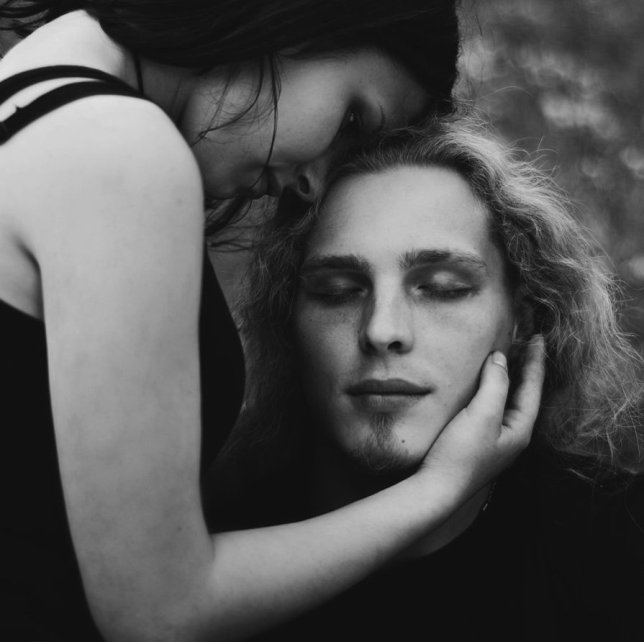
“Most people see the problem of love primarily as that of being loved, rather than that of loving, of one’s capacity to love.” ~ Erich Fromm.
My partner recently lent me a copy of Erich Fromm’s book The Art of Loving.
He’s a voracious reader and writer who has grown my stack of to-reads and to-writes to an impossible length in the time we’ve been together. What I’m about to share was inspired by my first real disagreement with him, a disagreement I am deeply grateful for. I think it’s safe to say he’s grateful for it, too.
It demonstrated to me that I have come quite far in my journey of loving others in a different way than I knew in my past. It provided an opportunity to practice what I preach: the idea of loving another human being consciously. It revealed to me that I should not fear conflict, but instead view it as a natural part of our existence as human beings.
After said recent disagreement, we talked about the many articles we’ve read on elephant journal and elsewhere on what it means to “consciously” love another human being. We’ve both experienced unhealthy relationships where feelings were stifled, real emotions buried, and resentments brewed. We made tough choices to walk away, rebuilding our lives and our selves and reconnecting to a deeper purpose behind and meaning to life.
But I found myself wondering: how does one find a “conscious” partner? What exactly does a “conscious” relationship entail? Is loving “consciously” just another yoga-ism that us yoga people love to say and overuse?
I should note: a prerequisite for loving others consciously is loving ourselves, first. That’s not the focus of today, but it’s one I’ve written about before. Self-love is about feeling worthy and deserving of love, but loving consciously is about how we go about loving others and our capacity to love other beings.
This is not just about romantic relationships. A commitment to consciously loving others transcends our romantic lives. We must practice consciousness in all levels and arenas of our lives for it to grow deep and enduring roots. Practicing a conscious approach to relationships means reevaluating our approach to relationships with friends, coworkers, family members, and romantic partners.
But just what does a conscious relationship entail?
1. A conscious relationship allows space for our humanity.
A conscious relationship acknowledges we are human beings and human beings have flaws. We make mistakes. We hurt one another by nature of our imperfections. This is life. Human beings have complex psychologies. If relationships were always full of rainbows and sunshine and unicorns, I wouldn’t have spent the last three years of my life finishing my degree in marriage and family therapy.
Consciously loving others means letting go of blame and coming to terms with our own imperfections. It’s uncomfortable. A conscious relationship also requires active reflection on why our past relationships failed and owning up to the roles we played in their ultimate demise.
Consciously loving another being means loving unconditionally. It does not mean loving who we hope our partner will become. There’s an authenticity to it as we love one another, flaws and all.
2. A conscious relationship communicates authentically.
It does not assume, but instead seeks clarification. Before I sat down to write this piece, I asked my partner: “So, I’ve had ideas brewing. But the thing is everything I want to write about is love and dating and relationships. And it’s hard for me to do that without writing about you and my idea is about us. So, um, is it okay for me to talk about us?” He smiled and gave me the green light. While he’s a writer, too, and understands inspiration comes in unexpected places, I did not assume. I asked. I communicated.
Conscious relationships also check the need to be right at the door. When a disagreement surfaces, conscious love does not become about right or wrong. It does not see in black and white, but rather seeks a resolution in the murky gray. The goal in conscious relationships is not winning an argument or convincing the other to see that you are “right.” Arguments only escalate when we fixate on proving the other person wrong.
My first love was an attorney. We constantly put each other on trial in an effort to prove the other guilty. Our egos were constantly on overdrive. The need to be right superseded preserving our love and it was a poison that eroded the foundation on which our relationship was built. I watched the same pattern with my parents growing up and fell right into the same trap as an adult. Communication isn’t about winning—it’s about learning and acknowledging when we’ve made a mistake.
3. A conscious relationship is not absent or afraid of conflict.
When there is a disagreement, a conscious relationship validates the other’s perspective and feelings and decides how best to move forward and learn.
This is because a conscious relationship acknowledges the full range of human emotions to be permissible, choosing not to assign a label to any. Be it anger, sadness, joy, or fear, there is no “bad” emotion. It lets go of the idea that we “should” or “shouldn’t” feel certain emotions. Each has a place as we practice loving consciously.
I grew up learning that anger was, inherently, bad. So I stuffed it down until it exploded. Anger turns to rage when we ignore what it has to teach us. A conscious relationship acknowledges that anger and hurt will happen and are normal experiences: it’s what we do with our anger and hurt that matters. A conscious relationship doesn’t stuff down feelings or ignore them. It seeks to learn from them. Consciously loving others sees emotions bubbling up as information to guide and to teach us.
Additionally, in order to consciously love someone, we must acknowledge the other person’s experience as valid, even if it’s confusing or different from our own. I’ve been triggered by my new partner. He’s been triggered by me. We’ve said things, without thinking, which have hurt or provoked sensitive parts of our histories. Once, I expressed to him that something he had said had brought up some painful emotions, only to learn that what I had just said caused him to feel triggered unexpectedly, too.
And guess what? It’s okay. Something that he’s said to me has been extremely healing: “You’re allowed to feel whatever you’re feeling.”
4. In a conscious relationship, space is healthy and necessary.
In my early 20s, I equated space with disaster. I interpreted a human being’s need for space and distance from me as abandonment.
A conscious relationship takes time as an individual and does not depend, exclusively, on the other for fulfillment. It holds that it is okay to take time to yourself and for your partner to do the same, without passing judgment.
5. A conscious relationship exists in the present.
It does not constantly dwell upon what happened three days, three months, or three years ago. This type of relationship expresses feelings and addresses conflict as it arises. It does not wait for things to boil, instead taking them as they come.
The challenging part about conscious relationships is that they’re generally quite different from how we were raised, our family patterns, and often our past relationships. It’s scary to dip our toes into these murky waters at times. This involves a new dance, and we have to learn new steps.
Here’s the thing: both human beings have to be committed to the dance for this to work. Coercion into consciousness is not likely to be successful. Only one person in a relationship committed to this type of authenticity and openness is like one person trying to dance salsa while the other dances ballroom. It doesn’t work. So be present, and try to learn the dance together.
6. A conscious relationship approaches life with a sense of humor.
Mistakes, mishaps, blunders, and miscommunications will happen. There’s beauty in this, too. Conscious relationships grow deeper as a result of conflict, viewing it as an opportunity to welcome rather than an uncomfortable burden to avoid.
—
As we begin to love one another more consciously, we begin to taste a more whole form of love, love that acknowledges all aspects of our humanity: physical, emotional, spiritual, intellectual, psychological, and even sexual. All of these are part of us.
Haven’t found that special someone to practice this type of loving with? Fear not. I’m a firm believer that as we create space for, feel more deserving of, and open ourselves to more conscious loving in all aspects of our lives, we begin to attract those with a similar desire to love in this way, whether romantically or in the form of deeper, more meaningful friendships.
I will leave you with a reminder from Fromm about the art that is loving and the practice it takes to love more consciously:
“We now are confronted with a much more difficult problem, that of the practice of the art of loving. Can anything be learned about the practice of an art, except by practicing it?”
I suppose when it comes to love the only real way to learn how to love another being consciously is to take a step forward. May we all look away from our screens and head into the world to practice the art of loving one another more consciously.
Author: Whitney Easton
Image: DeviantArt
Editor: Callie Rushton






Read 12 comments and reply